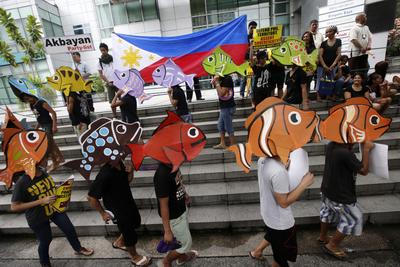Regrettably, Taiwan has already imposed sanctions which have affected cross-Channel relations, despite the fact that investigations from both sides are still underway.
Out of the four demands made by Taiwan, the calls for a fishery agreement are most significant. Taiwan has capitalised on the 9 May incident to pressure Manila to enter into talks, as indicated by President Ma’s preparedness to begin negotiations without waiting for the results of the investigation. The motives behind a joint fishery agreement are noble enough.Such an agreement would allow fishermen from participating countries to engage in fishing without fear of arrest, and to benefit mutually from disputed maritime resources. But the timing and readiness of both sides remain in question.
In general, joint development of fisheries resources requires a lot of political maturity and commitment from contracting parties. Any agreement must start by defining the territorial area which it would cover. This is usually the most sensitive issue because it requires parties to define what are disputed waters and what are not, and no national leader wants to appear as though they are surrendering an inch of maritime territory. But once both sides overcome this major hurdle, agreement on other less-contentious points, such as common fishing seasons, maximum catch limits, joint marine scientific research and collaboration in resource conservation, will likely follow.
Yet a fishery agreement at this point in time could be disadvantageous for the Philippines. For one, Taiwan has a more developed commercial fishing industry than the Philippines. In fact, at present, the operation of Taiwanese fishing vessels off Batanes and Cagayan in northern Philippines has been a perennial complaint of many local Filipinos, notably artisanal fishermen since many poachers were caught well within coastal or municipal waters. Thus, any joint fishing cooperation in the overlapping Exclusive Economic Zones of both countries will only increase Taiwan’s advantages. For some, a fisheries agreement would essentially amount to legalising poaching under the façade of cooperation.
There are also practical impediments to an agreement to cooperate to curb illegal fishing. Foreign poaching is rampant in northern Philippine waters, and losses are tremendous, amounting to some P75–P150 million ($US1.8–3.5 million) every year. But because of its inadequate maritime law enforcement capabilities, Manila was only able to apprehend 108 foreign nationals for illegal fishing from 2006–2012. The Philippines’ limited enforcement capabilities would also make it difficult for it to monitor or supervise the conduct of joint fishing activities.
It might be that Taiwan’s recent conclusion of a fisheries agreement with Japan over the waters surrounding the disputed Diaoyu/Senkaku islands has prompted it to propose a similar deal with the Philippines. The agreement allows fishermen from both countries to operate in a larger area without being subject to jurisdiction from the other state. This opens up 4,530 square kilometres of sea to Taiwanese fishermen, which could potentially generate US$6.7 billion in revenue. But even if this is the case, many Filipinos view the demanding, haughty (if not outright bullying) manner in which Taiwan has called for an agreement to be inappropriate. This is the case even among Filipino officials who see the possible merits of cooperating to manage common fisheries resources and curb illegal fishing outside the agreed zone.
Ultimately, a successful joint fisheries agreement will have to incorporate the principles of fairness and equitability. Neither side should appear to be disadvantaged or as though they are giving up their sovereign rights. Legal experts can work around domestic legal impediments, but both sides must address local passions and criticisms, especially as leaders under fire from local mass media or their political opponents may back out from discussions and waste the painstaking efforts that have already been invested. Contracting parties also need to muster up considerable flexibility, patience and political will. The Taiwan–Japan agreement took 16 rounds of negotiations over the course of 17 years to come to fruition. There is no reason to fast track a Philippines–Taiwan fisheries agreement, especially if doing so would not address the sensitive and crucial issues raised by both sides. Finally, maintaining harmonious bilateral relations will be critical during the negotiations.
Lucio Blanco Pitlo III is a Research Associate at the University of the Philippines Asian Center, where he is also taking up his MA in Asian Studies. The views expressed here are the author’s own.

